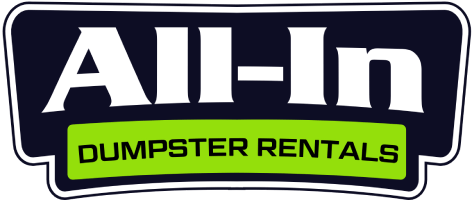Living in the beautiful mountains of Western North Carolina means enjoying stunning landscapes, but it also comes with unique responsibilities. For many Asheville neighborhoods, community cleanliness is a shared value that brings folks together. As the seasons change, particularly during spring and fall, the need for neighborhood-wide cleanups becomes apparent, but the cost of waste management can be a hurdle for individual homeowners.
Here in Asheville, we’ve seen a heartening trend of neighbors joining forces to tackle cleanup projects collectively, sharing not just the work but also the expense of dumpster rentals. The rolling hills and wooded properties of Buncombe County generate plenty of yard waste, while our region’s older homes often need periodic cleanouts that benefit from proper disposal solutions.
At All-In Dumpster Rentals, we frequently work with neighborhood groups across Asheville, Hendersonville, Waynesville, and surrounding communities who pool their resources for more affordable waste removal. These collaborative efforts not only save money but strengthen community bonds and improve local environments. By coming together for waste removal, these groups can also tackle larger initiatives, such as landscaping projects in Asheville, that beautify their neighborhoods. Through joint efforts, they can enhance the aesthetics of public spaces and create sustainable green areas for everyone to enjoy. Ultimately, these partnerships foster a sense of pride and ownership within the community, encouraging even more collaborative endeavors in the future. These partnerships also inspire joint initiatives like community clean-ups and landscaping projects in Asheville, where volunteers come together to enhance public spaces. By sharing dumpsters and resources, groups can tackle larger projects that might otherwise be impossible on an individual basis. Ultimately, this fosters a culture of collaboration and environmental stewardship that benefits everyone involved.
Benefits of Sharing Dumpster Costs in Asheville Neighborhoods
The primary advantage of splitting dumpster rental costs among neighbors is financial. When five or six households share the expense of a 15-yard dumpster, each family’s contribution drops significantly compared to renting individually. For example, a weekend rental that might cost $300-$400 could mean just $50-$75 per household when shared.
Beyond the obvious cost savings, there are other compelling benefits to communal cleanup efforts:
Community building becomes a natural byproduct of these projects. In neighborhoods like Montford or West Asheville, we’ve seen cleanup days transform into social events, with families working together and forming stronger connections.
Environmental impact is another important consideration. By consolidating waste into a single dumpster rather than making multiple trips to disposal facilities in personal vehicles, the carbon footprint of your cleanup efforts is reduced.
Efficiency increases dramatically when neighbors coordinate. Tasks that might take a single homeowner days to complete can be accomplished in hours with multiple helpers. This is especially valuable for seniors in our community who benefit from extra hands for physical tasks.
How to Organize a Neighborhood Dumpster Share in Western NC
Starting a neighborhood dumpster sharing arrangement takes some coordination, but the process is straightforward. Here’s a practical roadmap based on successful community cleanups we’ve supported across Buncombe County:
Begin by gauging interest among your neighbors. This could be as simple as creating a post on your neighborhood social media page or hanging flyers at community gathering spots. In areas like Fletcher or Candler, we’ve seen neighborhood associations take the lead in organizing these efforts.
Once you have interested participants, determine the scope of your cleanup. Are you focusing on yard waste after a storm? Planning a community-wide spring cleaning? The type of waste will influence the size and type of dumpster needed.
Next, select a coordinator who will be the point person for the rental. This individual typically handles collecting money from participants and communicating with the dumpster rental company. Having a single contact person streamlines the process.
Establish clear guidelines about what can and cannot go into the dumpster. This prevents prohibited items from being disposed of improperly and ensures everyone gets fair use of the space. Remember that certain materials like electronics, tires, and hazardous waste require special handling in Western North Carolina.
Choose a central, accessible location for dumpster placement. This might be a communal area, a willing neighbor’s driveway with extra space, or even a local business parking lot (with permission). Consider Asheville’s hilly terrain when selecting the spot – level ground is essential for safe dumpster placement. Additionally, ensure that the chosen location allows for easy access by both workers and any necessary vehicles. This is particularly important for larger landscaping projects in Asheville, where maneuverability can be limited by the surrounding hills. By carefully selecting your dumpster’s placement, you not only enhance efficiency but also maintain the aesthetics of the area during your project.
Planning Your Shared Cleanup Timeline
Timing is crucial for successful community cleanups. In Asheville’s climate, late spring and early fall offer ideal weather conditions for outdoor work. Planning around these periods can make your cleanup day more pleasant and productive.
Schedule your dumpster delivery at least a day before your planned cleanup event. This gives you flexibility and ensures everything is in place when neighbors arrive ready to work. Most neighborhood cleanups in our service area work well with a weekend rental, allowing residents to contribute time at their convenience over a two-day period.
Create a simple schedule that outlines when the dumpster will arrive, when the main cleanup activities will happen, and when the dumpster will be picked up. Share this timeline with all participants so everyone can plan accordingly.
Weather contingencies are important in our mountain region. Have a rain date planned, and make sure all participants know how schedule changes will be communicated. A simple text chain or neighborhood app can work well for quick updates.
Fair Cost Sharing Strategies for Neighborhood Cleanups
Determining how to divide costs fairly among neighbors requires thoughtful consideration. Several approaches have proven successful in communities across Western North Carolina:
Equal splits work well for neighborhoods where homes are similar in size and likely to generate comparable amounts of waste. Each household contributes the same amount toward the rental fee.
Usage-based contributions might be more appropriate when some neighbors have significantly more waste than others. In this model, neighbors might pay proportional to how much dumpster space they expect to use.
Consider creating a neighborhood cleanup fund where residents contribute small amounts throughout the year. This can make larger cleanup projects more manageable financially when they arise, especially in areas like Madison County or rural parts of Henderson County where regular waste service might be limited.
For neighbors who cannot contribute financially, suggest alternative contributions like providing refreshments for workers, helping with organization, or offering additional labor. This ensures everyone can participate regardless of financial circumstances.
Communication Tips for Smooth Coordination
Clear communication prevents misunderstandings and ensures your community cleanup runs smoothly. From our experience working with neighborhoods throughout Asheville and surrounding areas, we recommend:
Create a dedicated communication channel for your cleanup project. This could be a group text, email chain, or post on a neighborhood platform. Make sure all participants have access.
Clearly document all agreements about costs, scheduling, and responsibilities. While most neighborhood arrangements stay informal, having basic terms written down prevents confusion.
Share educational information about proper disposal practices. Many Asheville residents are environmentally conscious and appreciate guidance on responsible waste management.
Provide regular updates as the project approaches, including confirmation of dumpster delivery times and any last-minute changes. This helps maintain momentum and ensures good participation.
Making Your Community Cleanup Day Successful
When the big day arrives, a little organization goes a long way toward making your neighborhood cleanup enjoyable and productive:
Start early to take advantage of cooler morning temperatures, especially during summer months. Asheville’s mountain climate can be unpredictable, so having flexible hours allows participants to work when conditions are best.
Assign specific tasks or areas if you’re tackling public spaces like neighborhood entrances or shared green areas. This prevents duplication of efforts and ensures all necessary work gets done.
Consider safety needs, including traffic management if you’re cleaning roadside areas. Many of our winding mountain roads require careful attention to safety during cleanup activities.
Document your efforts with photos for your neighborhood newsletter or social media. Success stories inspire future participation and create a sense of accomplishment.
Celebrate your accomplishments! Many neighborhoods in Asheville finish their cleanup days with a potluck or barbecue, strengthening the community bonds that made the project possible.
Building on Your Community Cleanup Success
After completing your first successful shared dumpster rental, consider how to build on this community momentum:
Schedule regular cleanup events if they prove popular. Many neighborhoods in Western North Carolina find that quarterly or bi-annual cleanups work well with our seasonal changes.
Expand your efforts beyond basic cleanup to include beautification projects like planting native flowers or installing bird houses. These additions enhance your neighborhood’s appeal and ecological value.
Connect with other neighborhoods to share successful strategies. What works in Arden might offer valuable lessons for communities in Waynesville or Fletcher.
Partner with local environmental organizations for additional support and resources. Asheville has a strong network of conservation-minded groups eager to support community initiatives.
Consider formalizing your neighborhood cleanup committee if interest remains strong. This creates continuity and makes organizing future events more efficient.
Community cleanup projects demonstrate the special character of Western North Carolina neighborhoods. By working together and sharing resources, neighbors create not just cleaner spaces but stronger relationships and a deeper sense of pride in their mountain home.
At All-In Dumpster Rentals, we’re proud to support these collaborative efforts across Buncombe, Henderson, Haywood, and Madison counties. Whether you’re coordinating your first neighborhood cleanup or continuing a cherished local tradition, we’re here to help make waste management simple, affordable, and community-friendly.
When neighbors join forces, even the biggest cleanup projects become manageable. That’s the spirit of Asheville – working together to keep our mountain paradise beautiful, one neighborhood at a time.

